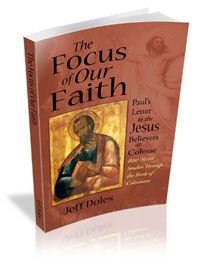Having passed along the greetings of his ministry associates, Paul adds a few of his own:
Greet the brethren who are in Laodicea, and Nymphas and the church that is in his house.There are close associations between the believers at Colosse and those at Laodicea. For one thing, they are only about ten miles apart. For another, Epaphras actively ministered to both groups (as well as at Hierapolis). So, although Paul writes to the believers at Colosse, it is natural that he has them extend his greetings to those at Laodicea. Indeed, he wants to be sure that this letter itself will be shared with them all.
Now when this epistle is read among you, see that it is read also in the church of the Laodiceans, and that you likewise read the epistle from Laodicea. And say to Archippus, “Take heed to the ministry which you have received in the Lord, that you may fulfill it.”
This salutation by my own hand — Paul. Remember my chains. Grace be with you. Amen. (Colossians 4:15-18)
“Nymphas” appears to be one of these believers. Though the name in the NKJV and some other versions is masculine in form, there are also a number of other versions that render it as feminine, “Nympha,” including the NASB, NIV, ESV, LEB and CEV. The reason for this is that the early copies of this letter speak of the church that meets in “her” house. It is more likely that early copyists would have changed “her” to “his” rather than “his” to “her,” so “her” would more likely the original reading.
Churches did not meet in public spaces but in private houses. Nympha’s was one. Philemon’s was another. Paul’s letter to him is addressed, “To Philemon our beloved friend and fellow laborer, to the beloved Apphia, Archippus our fellow soldier, and to the church in your house” (Philemon 1-2). Apphia might have been Philemon’s wife, and Archippus their son. The church met in their home.
Paul speaks of a letter he wrote to Laodicea, which he wants to be read at Colosse also, but this has never been conclusively identified. Some have suggested that it is the book of Ephesians, which is very similar to Colossians. Others suggest that it was the letter to Philemon, since he might have been closer to Laodicea and there was a church that met in his house. Or perhaps the letter simply no longer exists.
There is a personal word to Archippus, “Take heed to the ministry which you have received in the Lord, that you may fulfill it.” This is not a suggestion that Archippus has somehow been slack in his duties. We do not know exactly what this ministry entails. Perhaps he is a pastor of the church that meets in his house, or maybe he is filling the position at Colosse left vacant by the absence of Epaphras, and Paul is giving him a word of encouragement in this new role. Paul has identified a number of things about which the believers at Colosse and their leaders need to be aware, and it appears that Archippus did indeed “take heed.” Church tradition has him as the first bishop of Laodicea and numbers him among the “Seventy Apostles.”
Finally, Paul closes his letter with a few words in his own hand. His letters were usually written down by an amanuensis, a secretary of sorts. His own handwritten words were usually brief. Here, they are quite simple: “Remember my chains. Grace be with you. Amen.” Paul wants to remind them that he needs their prayers. It is similar to the way the letter to the Hebrews closes, “Remember the prisoners as if chained with them — those who are mistreated — since you yourselves are in the body also” (Hebrews 13:3). The message is that we are all in this together. Paul would also want them to remember that he was in chains for their sake, as well as for the gospel of King Jesus the Messiah.
Paul also usually closes with a benediction, such as, “Grace be with you.” Simple but profound. It is not merely a custom, though. Paul really has the grace of God in mind, and it is for every believer just as much as it is for him. “Amen” affirms the truth of that grace and, indeed, of all he has written to them.
Focus Questions
- The early Church met in homes. Was this merely because of the times or were there advantages to it?
- Why did Paul want the church at Laodicea to read the letter he wrote to the church at Colosse? Why is this letter important for us today?
- What ministry have you received from the Lord and how do you know when you have fulfilled it?

The Focus of Our Faith
Paul’s Letters to the Jesus Believers at Colosse
Bite-Size Studies Through Colossians
by Jeff Doles
Preview with Amazon’s “Look Inside.”
Available in paperback and Kindle (Amazon), epub (Google and iTunes) and PDF.


No comments:
Post a Comment